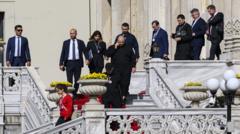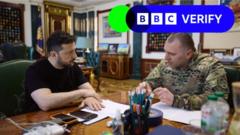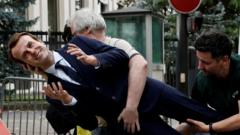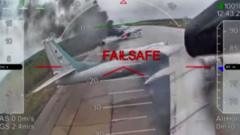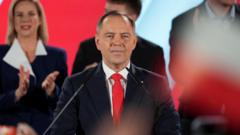General Carsten Breuer emphasizes the urgency of strengthening NATO defenses amid rising Russian military capabilities.
**Germany Warns of Potential Russian Attack on NATO by 2029**

**Germany Warns of Potential Russian Attack on NATO by 2029**
German defense chief alerts NATO members to readiness for possible Russian aggression in the coming years.
In a stark warning, Germany's chief of defense, General Carsten Breuer, has urged NATO members to brace for a potential Russian military attack within the next four years. Speaking at the Shangri-la Dialogue, a prominent defense summit held in Singapore, Breuer highlighted Russia's extensive military buildup, including the production of around 1,500 battle tanks annually. He indicated that many of these tanks could potentially be deployed against NATO's Baltic state members by 2029, or even sooner.
Breuer insisted that despite some recent disagreements among member nations, notably Hungary and Slovakia, NATO remains committed and unified in its response to the ongoing war in Ukraine. At the forefront of his concerns is the so-called Suwalki Gap, a strategically vital corridor bordered by Poland, Lithuania, Russia, and Belarus, which has become increasingly vulnerable due to Russian military maneuvers.
The general articulated the urgency for NATO to enhance its readiness, asserting that they must be capable of responding to threats at a moment's notice. Citing the historical context, he compared the situation faced by the Baltic States to being near a wildfire, underlining the different perceptions of the threat level within Europe. While some nations, such as Estonia, feel the immediate dangers, others, including Germany, perceive only the distant threat.
In addition to the acceleration of military production, Breuer noted concerning incidents like undersea cable attacks and cyber assaults targeting European infrastructure. He argued that NATO must significantly ramp up its military capabilities to deter potential threats and safeguard its member nations.
Despite some concerns regarding cohesion within NATO due to closer ties between Hungary, Slovakia, and Moscow, Breuer pointed to the solidarity shown by Finland and Sweden in their decision to join the alliance after the Ukraine invasion. These developments illustrate a profound shift in defense perspectives across Europe, especially in Germany, which has historically underfunded its military.
As tailwinds of increased military funding emerge, general skepticism still surrounds the ability of European defense industries to effectively counter the scale and speed of Russian military advancements. With debates intensifying over defense budgets and preparedness, NATO's collective security stance is being challenged, as member nations grapple with the reality of increased military readiness in a changing geopolitical landscape.
Breuer insisted that despite some recent disagreements among member nations, notably Hungary and Slovakia, NATO remains committed and unified in its response to the ongoing war in Ukraine. At the forefront of his concerns is the so-called Suwalki Gap, a strategically vital corridor bordered by Poland, Lithuania, Russia, and Belarus, which has become increasingly vulnerable due to Russian military maneuvers.
The general articulated the urgency for NATO to enhance its readiness, asserting that they must be capable of responding to threats at a moment's notice. Citing the historical context, he compared the situation faced by the Baltic States to being near a wildfire, underlining the different perceptions of the threat level within Europe. While some nations, such as Estonia, feel the immediate dangers, others, including Germany, perceive only the distant threat.
In addition to the acceleration of military production, Breuer noted concerning incidents like undersea cable attacks and cyber assaults targeting European infrastructure. He argued that NATO must significantly ramp up its military capabilities to deter potential threats and safeguard its member nations.
Despite some concerns regarding cohesion within NATO due to closer ties between Hungary, Slovakia, and Moscow, Breuer pointed to the solidarity shown by Finland and Sweden in their decision to join the alliance after the Ukraine invasion. These developments illustrate a profound shift in defense perspectives across Europe, especially in Germany, which has historically underfunded its military.
As tailwinds of increased military funding emerge, general skepticism still surrounds the ability of European defense industries to effectively counter the scale and speed of Russian military advancements. With debates intensifying over defense budgets and preparedness, NATO's collective security stance is being challenged, as member nations grapple with the reality of increased military readiness in a changing geopolitical landscape.




